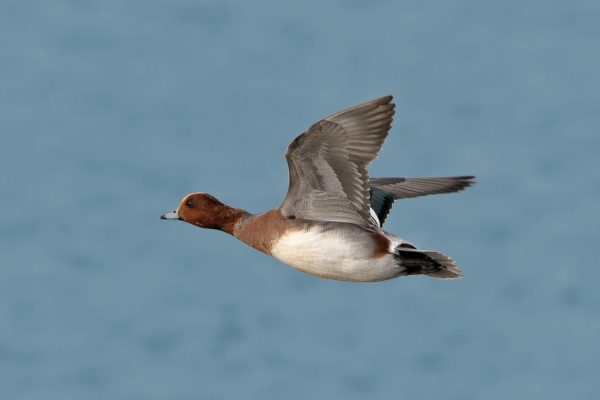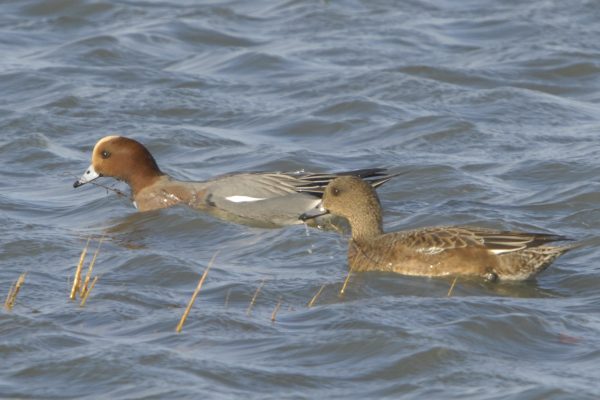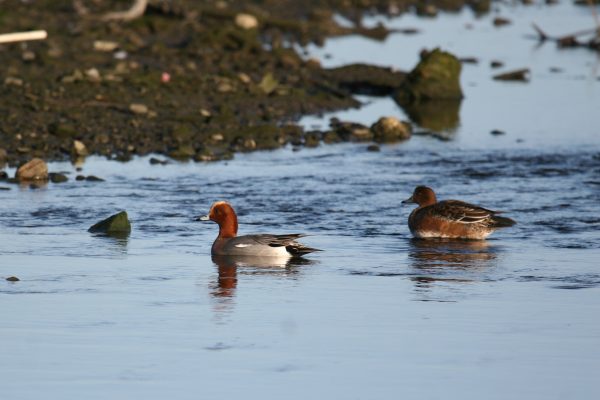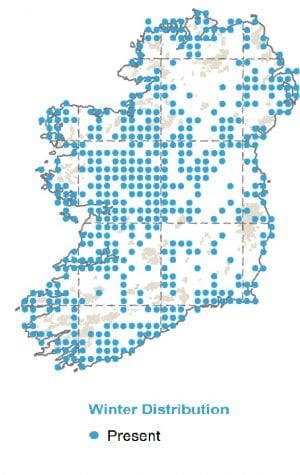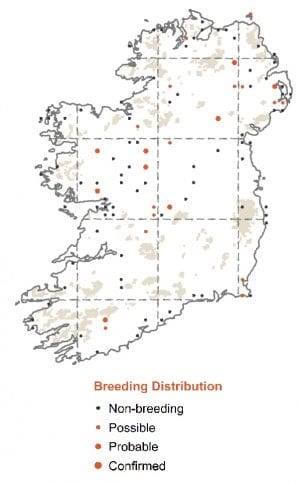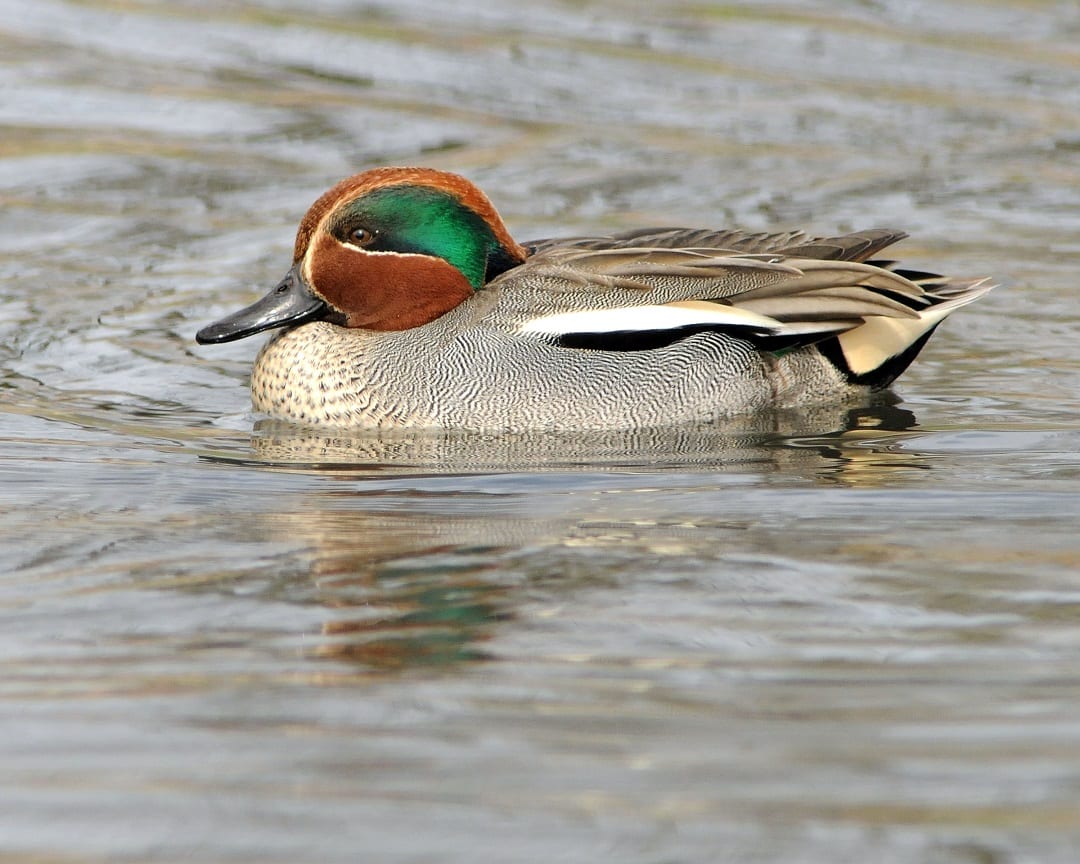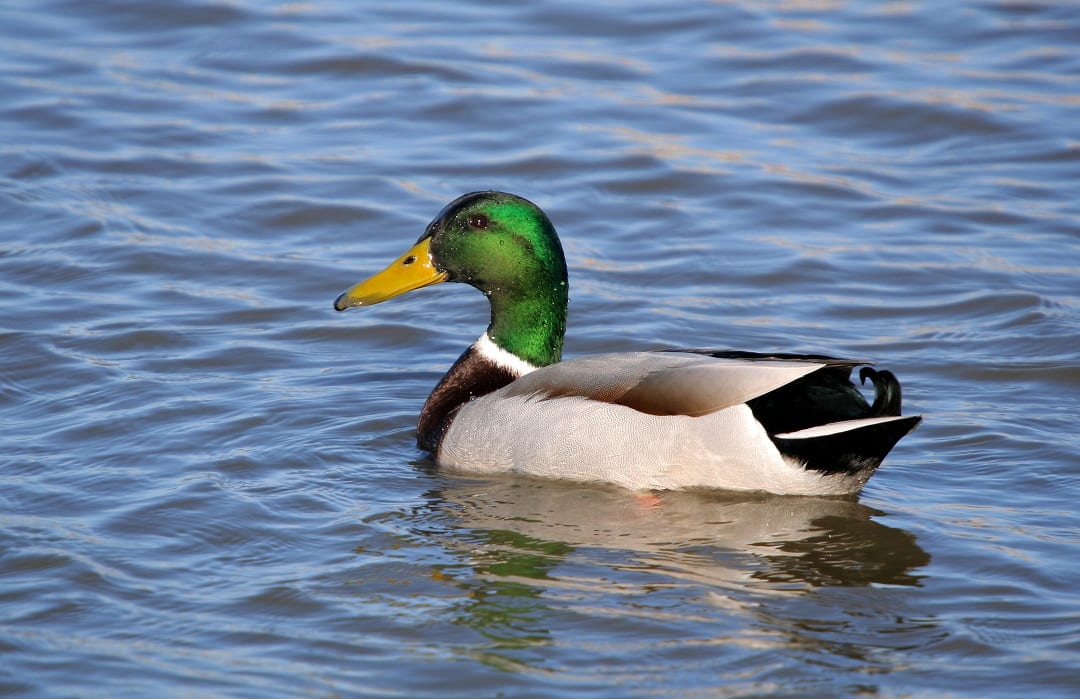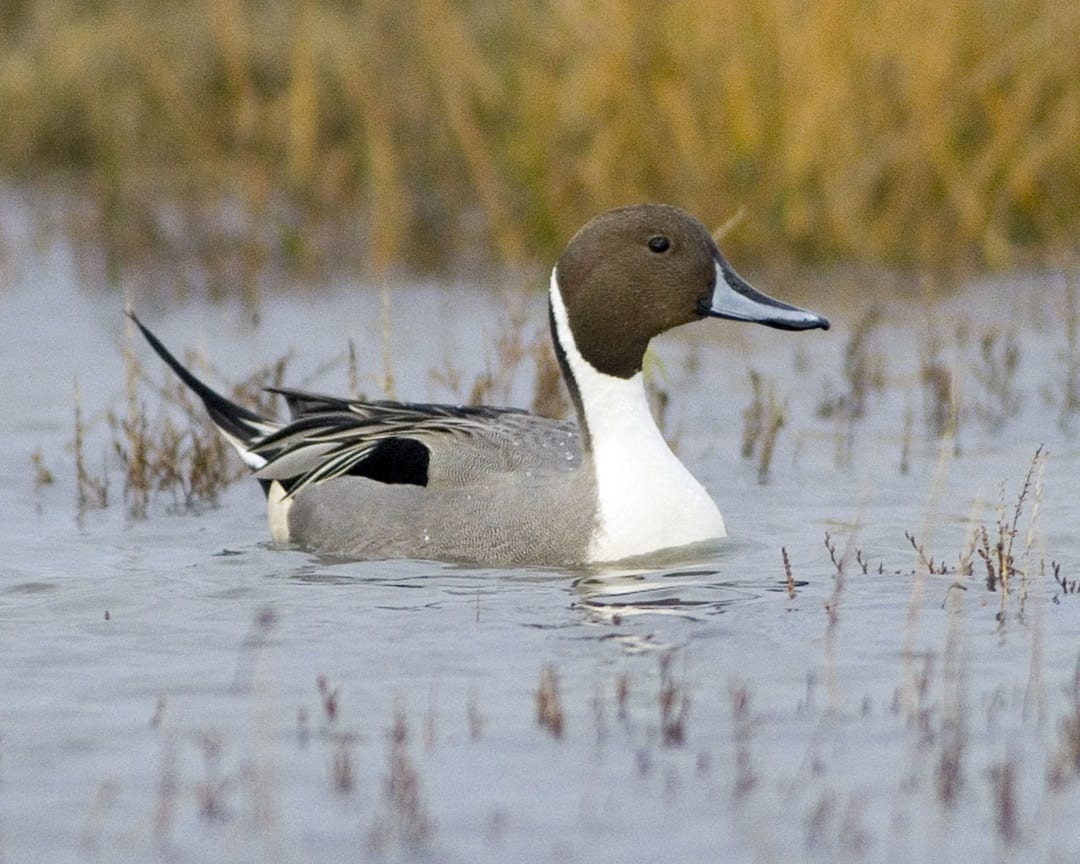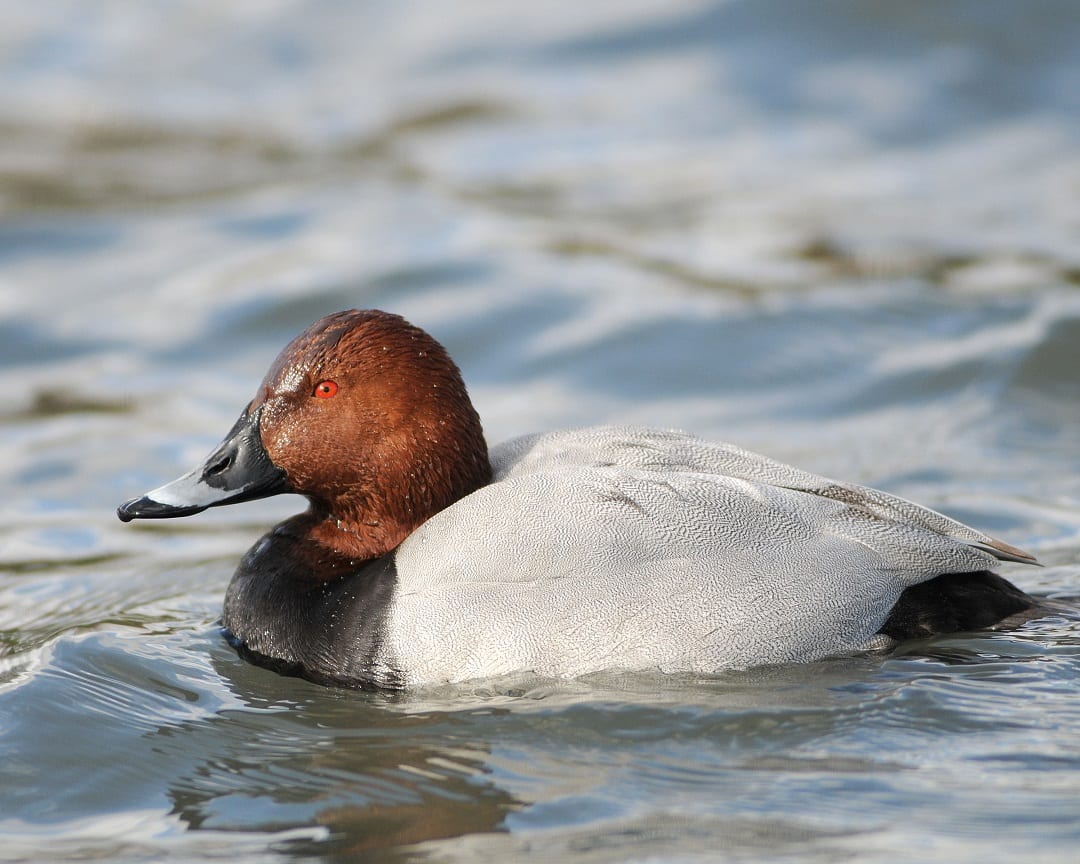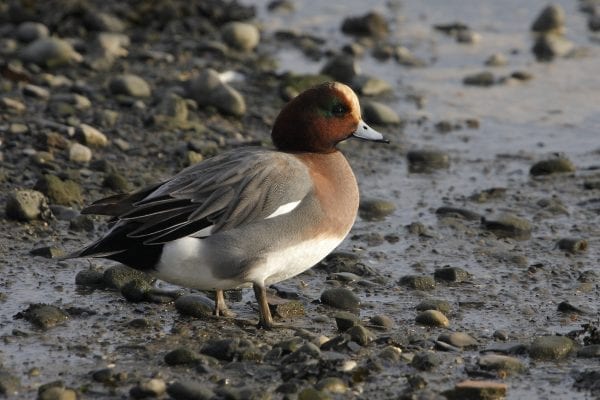
Wigeon
| Irish Name: | Rualacha |
| Scientific name: | Mareca penelope |
| Bird Family: | Ducks |
amber
Conservation status
Conservation status
Status
Common winter visitor to wetlands throughout Ireland from September and April.
Identification
A medium-sized duck with large rounded head, small bill and pointed tail. The males has a russet head and neck with a creamy yellow crown and forehead. The breast ispinkish-grey, and the rest of the body is grey and white with a black stern. The female is a greyish brown colour with various mottled patterns. Speculum dull, dark.
Voice
Call is a loud whistling note.
Diet
This species grazes on coastal seagrass and algae, particularly on Zostera spp. and Enteromorpha spp., and also feeds regularly on grasslands and cereal crops.
Breeding
Breed on shallow freshwater marshes, under tussocks adjacent to lakes and lagoons or on lake islands.
Wintering
Widespread - they occur on coastal marshes, freshwater and brackish lagoons, estuaries, bays. Many on inland wetlands, lakes, rivers and turloughs. The Icelandic breeding component of this population winters mostly in Ireland and western Britain, though some continue on to parts of continental Europe.
Monitored by
Blog posts about this bird
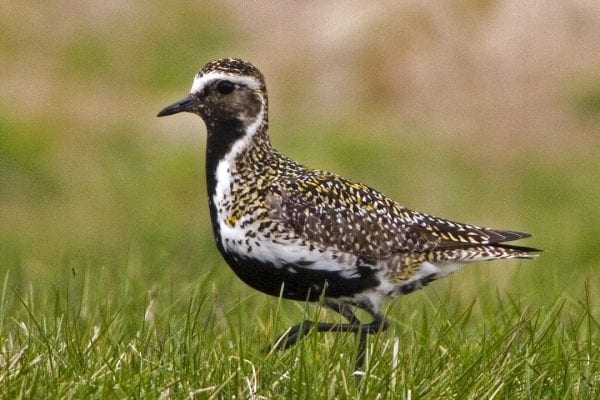
BirdWatch Ireland expresses disappointment at outcome of Open Seasons Order review
BirdWatch Ireland acknowledges publication of changes to the Open Seasons Order by Minister Noonan for the coming season.
The removal of four duck species – Scaup, Pochard, Goldeneye and Pintail – due to severe declines in their populations shows some progress by the Minister to address the vulnerable status of these species. However, BirdWatch Ireland is disappointed that two additional species that we recommended for removal – Shoveler and Golden Plover – remain on the list though the science clearly shows declines in those populations also.
No rationale has been provided as to why these species remain on the list. The information provided announcing the decision is inadequate and lacking detail. The most severe impacts to waterbirds and wading birds that are on the Open Seasons Order relate to habitat loss and degradation, pollution, disturbance and climate change. However, every pressure and threat must be addressed considering the dire conservation status of many of the species that are huntable in Ireland. We hope that hunting organisations will support this decision and we also hope that government will assist hunting organisations to be able to contribute to data collection in Ireland.
Earlier this year, BirdWatch Ireland called for six of the 21 bird species currently permitted to be hunted under the Open Seasons Order to be removed from the list, a suggestion underpinned by the robust scientific evidence of their ongoing declines in Ireland. We also urged for more analysis to be undertaken by the National Parks and Wildlife Service (NPWS) to determine how best to proceed in relation to nine of the other species listed. These proposals were some of many made as part of our submission to the public consultation on the review of the Open Seasons Order for Birds.
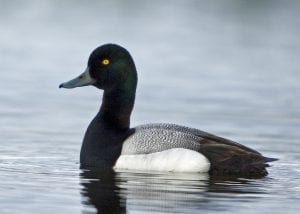 Launched on March 22 by Minister of State for Heritage and Electoral Reform, Malcolm Noonan, this consultation was aimed at gathering views to ensure that the hunting of the listed species was sustainable and in line with Ireland’s obligations under EU legislation. It also offered an opportunity to put forward other suggestions in relation to improving data collection and protecting vulnerable bird species in Ireland. In the submission, BirdWatch Ireland stated that Shoveler, Scaup, Pochard, Goldeneye, Golden Plover and Pintail should be removed from the list of species permitted for hunting. Of these species, five are Red-listed species on the Birds of Conservation Concern Ireland (BOCCI) list, while one – the Pintail – is an Amber-listed species. Indeed, data from BirdWatch Ireland’s Irish Wetland Bird Survey (I-WeBS) – one of Ireland’s longest-running wildlife monitoring programmes – has shown steep short- and long-term declines in the populations of these species. According to the latest I-WeBS data, which is collected in a standardised manner and analysed using best practice methods developed by international scientists, the Republic of Ireland population of Pochard is estimated to number 4,729 individuals, with estimates for the other species even lower – Shoveler (1,865), Goldeneye (1256), Pintail (1,017) and Scaup (167).
BirdWatch Ireland has also called for further analysis to be undertaken by the NPWS in relation to nine of the other species listed – Tufted Duck, Snipe, Mallard, Woodcock, Teal, Gadwall, Red Grouse, Wigeon and Jack Snipe. Of these species, three are currently Red-listed (Snipe, Woodcock, Red Grouse), with five Amber-listed (Tufted Duck, Mallard, Teal, Gadwall, Wigeon) and one Green-listed (Jack Snipe). Declining populations as underpinned by IWeBS data coupled with a number of data gaps give serious cause for concern for these species. BirdWatch Ireland called for the NPWS to carry out additional analysis of the data for these species across their wintering and breeding populations and range, in order to inform the best next steps to take for them.
In addition to the suggested changes to the Open Seasons Order Species list, BirdWatch Ireland made a number of other suggestions in its submission. It is calling for the Open Seasons Order to be reviewed more regularly, particularly in light of the ongoing threat of Highly Pathogenic Avian Influenza (HPAI) and the rapid negative change that could occur in a population as a result of an outbreak.
Supporting hunting organisations in the collection of data, extending the network of wildfowl sanctuaries, implementing a more regional- and county-based approach for certain species and addressing the issue of disturbance at important wetland sites are some of the other suggestions put forward by BirdWatch Ireland.
Launched on March 22 by Minister of State for Heritage and Electoral Reform, Malcolm Noonan, this consultation was aimed at gathering views to ensure that the hunting of the listed species was sustainable and in line with Ireland’s obligations under EU legislation. It also offered an opportunity to put forward other suggestions in relation to improving data collection and protecting vulnerable bird species in Ireland. In the submission, BirdWatch Ireland stated that Shoveler, Scaup, Pochard, Goldeneye, Golden Plover and Pintail should be removed from the list of species permitted for hunting. Of these species, five are Red-listed species on the Birds of Conservation Concern Ireland (BOCCI) list, while one – the Pintail – is an Amber-listed species. Indeed, data from BirdWatch Ireland’s Irish Wetland Bird Survey (I-WeBS) – one of Ireland’s longest-running wildlife monitoring programmes – has shown steep short- and long-term declines in the populations of these species. According to the latest I-WeBS data, which is collected in a standardised manner and analysed using best practice methods developed by international scientists, the Republic of Ireland population of Pochard is estimated to number 4,729 individuals, with estimates for the other species even lower – Shoveler (1,865), Goldeneye (1256), Pintail (1,017) and Scaup (167).
BirdWatch Ireland has also called for further analysis to be undertaken by the NPWS in relation to nine of the other species listed – Tufted Duck, Snipe, Mallard, Woodcock, Teal, Gadwall, Red Grouse, Wigeon and Jack Snipe. Of these species, three are currently Red-listed (Snipe, Woodcock, Red Grouse), with five Amber-listed (Tufted Duck, Mallard, Teal, Gadwall, Wigeon) and one Green-listed (Jack Snipe). Declining populations as underpinned by IWeBS data coupled with a number of data gaps give serious cause for concern for these species. BirdWatch Ireland called for the NPWS to carry out additional analysis of the data for these species across their wintering and breeding populations and range, in order to inform the best next steps to take for them.
In addition to the suggested changes to the Open Seasons Order Species list, BirdWatch Ireland made a number of other suggestions in its submission. It is calling for the Open Seasons Order to be reviewed more regularly, particularly in light of the ongoing threat of Highly Pathogenic Avian Influenza (HPAI) and the rapid negative change that could occur in a population as a result of an outbreak.
Supporting hunting organisations in the collection of data, extending the network of wildfowl sanctuaries, implementing a more regional- and county-based approach for certain species and addressing the issue of disturbance at important wetland sites are some of the other suggestions put forward by BirdWatch Ireland.
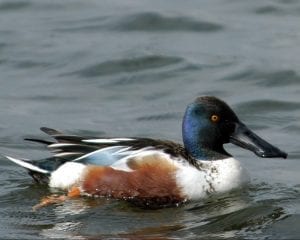 Throughout the submission, BirdWatch Ireland noted the Irish Government’s ongoing failure comprehensively to address the conservation of wild bird species and its poor track record in upholding its environmental commitments under EU law. This is despite Dáil Éireann’s declaration of a climate and biodiversity emergency in 2019, and the well-established fact that Ireland’s wild birds are faring worse than ever. Indeed, BirdWatch Ireland’s Birds of Conservation Concern in Ireland assessment in 2021 showed that 63 per cent of Ireland’s regularly occurring species are Red or Amber listed birds of conservation concern.
All birds, including Red and Amber-listed species, are facing numerous human-induced pressures and it is vital that the individual and cumulative impacts of these pressures are addressed.
If the State wishes to have any chance of reversing populations declines, it urgently needs to enforce environmental legislation, as well as ensure sectoral policies such as agriculture, afforestation, renewable energy and peatlands have conservation of bird species integrated firmly in their plans and processes.
Throughout the submission, BirdWatch Ireland noted the Irish Government’s ongoing failure comprehensively to address the conservation of wild bird species and its poor track record in upholding its environmental commitments under EU law. This is despite Dáil Éireann’s declaration of a climate and biodiversity emergency in 2019, and the well-established fact that Ireland’s wild birds are faring worse than ever. Indeed, BirdWatch Ireland’s Birds of Conservation Concern in Ireland assessment in 2021 showed that 63 per cent of Ireland’s regularly occurring species are Red or Amber listed birds of conservation concern.
All birds, including Red and Amber-listed species, are facing numerous human-induced pressures and it is vital that the individual and cumulative impacts of these pressures are addressed.
If the State wishes to have any chance of reversing populations declines, it urgently needs to enforce environmental legislation, as well as ensure sectoral policies such as agriculture, afforestation, renewable energy and peatlands have conservation of bird species integrated firmly in their plans and processes.
